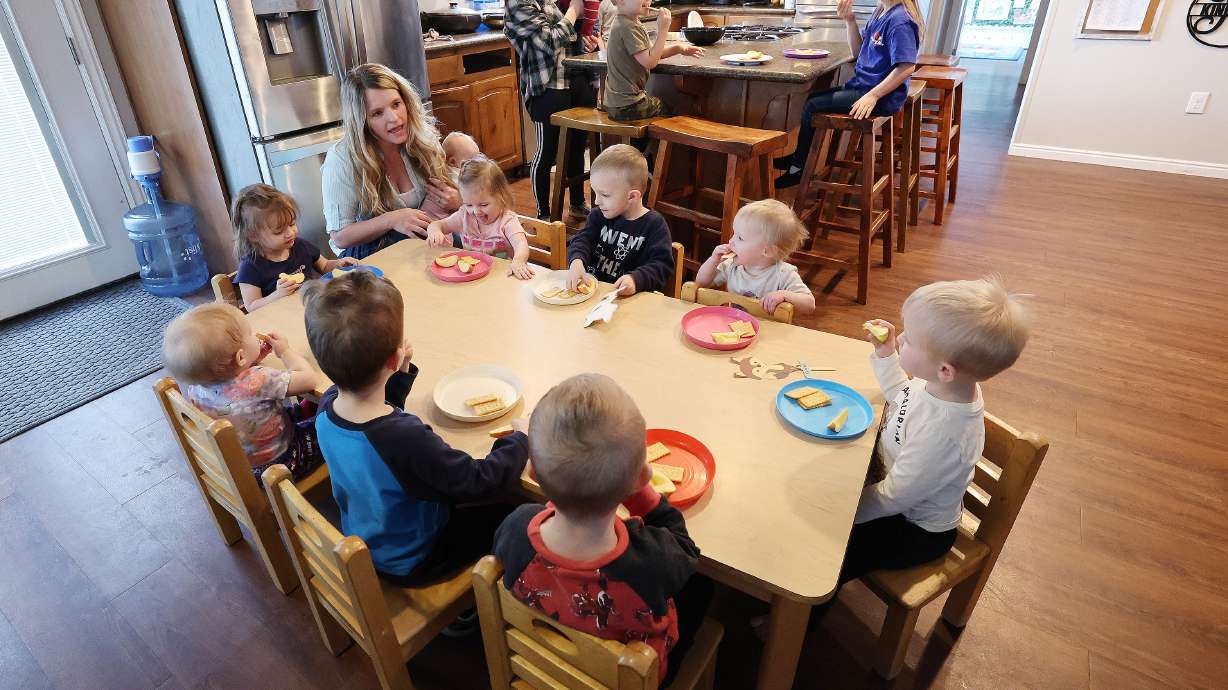Estimated read time: 4-5 minutes
This archived news story is available only for your personal, non-commercial use. Information in the story may be outdated or superseded by additional information. Reading or replaying the story in its archived form does not constitute a republication of the story.
SALT LAKE CITY — Sending a child to day care is a financial burden for many Utah families, and the already scant options of licensed child care in the state will be even smaller come spring, according to Voices for Utah Children.
The advocacy organization recently reported that licensed child care program capacity meets the needs of just 36% of Utah children under the age of 6 whose parents are working. Since 2020, federal stabilization funds have helped Utah's child care system grow its capacity by 31%, Voices for Utah Children reported in a news release.
"Federal funding streams, totaling nearly $600 million, have contributed to an incredible increase in licensed child care capacity, showing that strong public investment has a direct, positive impact on child care accessibility," the news release states.
We can't get grants, we can't get government funding, because we're a business … but we are providing some of the most crucial services.
–Anna Ekk, child care provider
However, these grants were reduced by 75% in October and will be gone by the spring. Unless new funding is secured, half or more of all licensed child care in the state may close, according to the Century Foundation, a New York think tank that works for policy change.
Voices for Utah Children released a report called, "Mapping Care for Kids: A County-Level Look at Utah's Crisis in Licensed Child Care." The goal of the report is to inform both policymakers and the general public about the great need for child care reform in the state.
A family sending two children to day care, a baby or a toddler and a preschool-aged child, will spend an average of 17% of their overall income every year.
Alexis Pendley, of Murray, works full-time and sends her youngest child to day care in Salt Lake County three days a week. Even just sending her daughter to day care part-time, Pendley estimates 17% to 20% of their family income goes toward child care costs.
In addition to the expense, it was a burden to find a day care Pendley trusted, and she found some facilities had waitlists six months to a year.
"It would be amazing if the state was able to step in and help make day care more affordable, and I feel like that's the only … solution because if you do the math on what you're actually paying for day care … if I factor in the hours that she's there, it comes out to be like $9 an hour," Pendley told KSL.com. "I can't find anybody to watch my kid for $9 an hour, but that's what I'm paying essentially at day care. Plus, they're feeding her. Plus … I don't have to provide sheets or anything like that. I basically send her with a water bottle and diapers and wipes and extra clothes and that's it. … The day cares can't charge less, and it's not like they're paying their people some extraordinary amount."
Working parents and their children aren't the only Utahns facing the burden of losing federal stabilization grants. Licensed child care providers are suffering, as well.
"As a provider, I struggle to raise our rates, because I care about the families I serve," Katie Martinez, director at Kid's First Center in Layton, told Voices for Utah Children. "I know that most providers agree. We never want to add additional burdens to anyone. However, if we want to remain open to support families, we have to."
Child care providers in Utah make an average of $12.87 an hour, a wage lower than that of professional dog walkers, the press release states.
"Providers often make long-term sacrifices. I have a lot of health stuff that needs to be addressed and is building up. But without insurance and with the stabilization grants going away to help cover teacher time, I feel stuck and have to stick to Band-Aid solutions. And I need to be investing in retirement," Kristy DeGraaf, owner of the Learning Tree in Cedar City, told Voices for Utah Children.

Anna Ek owns a child care center and early learning academy in Salt Lake City called The Mom Pod Co., which offers the unique service of drop-in care in addition to their full-time rates. If a parent needs to drop their child off for an hour or two, they only pay $6 and it's a guaranteed low student-to-teacher ratio.
Ek said she wishes the state of Utah would make it easier for providers to obtain grant money for their day cares. She funds The Mom Pod Co. out of her own pocket and is planning to open a second location, but feels there is a lot of red tape to go through when it comes to obtaining these grants.
"It's a lot of money that goes into what the parents want, but they don't want to pay for," Ek said. "And yet we can't get grants, we can't get government funding, because we're a business … but we are providing some of the most crucial services."
She would love if state government could walk providers through the entire grant process so they wouldn't have to repeat the whole thing if they get it wrong.
The "Mapping Care for Kids" report supports the cause of public investment in child care. "The report advocates for measures to help parents afford the care they want and supports the critical work of child care providers by proposing state funding of Child Care Stabilization Grants, wage supplement programs, and other beneficial reforms," the news release states.










